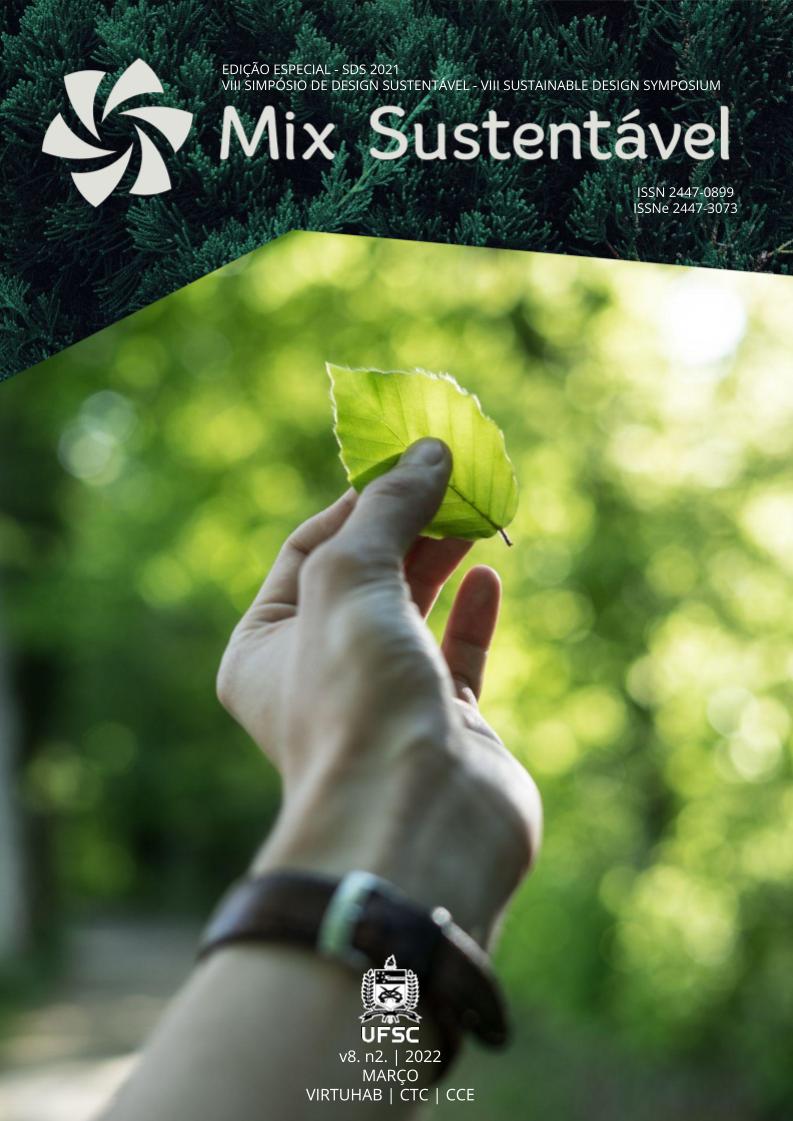TEXTILE WASTE REVALUATION SYSTEM: FROM DESIGN TO IMPLEMENTATION
DOI:
https://doi.org/10.29183/2447-3073.MIX2022.v8.n2.109-120Keywords:
Textile Waste, Recycling, Collectors Cooperatives, Systems Design, Circular Economy.Abstract
This article presents the planning process and the current stage of implementation of a post-consumer and industrial textile waste reuse system in a waste picker cooperative in the city of Londrina, called Textile Waste Bank (BRT). This system represents a new business opportunity for the cooperative, seeking to create new jobs and income for waste pickers whose economic and financial situation has been aggravated by the Covid19 pandemic that affects Brazil and the world. The theoretical-methodological bases of this study include Systems Design, Design for Sustainability, Circular and Distributed Economy, among others, and the research methodology is based on Action Research in Design, complemented with other auxiliary methods. Initial results include the definition of the BRT operating model, production flow, product development and acquisition of equipment that will be installed in the cooperative for processing textile waste, as well as articulation with a partner company for the initial supply of materials for testing of production.
References
BRASIL, Lei no 12.305, de 2 de agosto de 2010. Disponível em: <http://www.planalto.gov.br/ccivil_03/_ato2007-2010/2010/lei/l12305.htm> Última visita: 20 abr. 2021.
BROWN, T., 2010. Design Thinking: Uma metodologia poderosa para decretar o fim das velhas ideias. São Paulo: Campus.
HOORNWEG, D., BHADA-TATA, P. What a Waste: A Global Review of Solid Waste Management. World Bank, 2012.
ISON, R. Systems Practice: How to Act in a Climate-Change World. London: Springer, 2010.
JOHANSSON, Allan; KISCH, Peter; MIRATA, Murat. Distributed economies: A new engine for innovation. Journal of Cleaner Production. [S. l.], p. 971-979. 22 dez. 2005.
MANZINI, Ezio, VEZZOLI, Carlo. O Desenvolvimento de Produtos Sustentáveis: os requisitos ambientais dos produtos industriais. São Paulo: Edusp – Editora da Universidade de São Paulo, 2002
MCDONOUGH, W.; BRAUNGART, M. Cradle to cradle: remaking the way we make things. New York: North, 2002.
OSTERWALDER, A. and PIGNEUR, Y. Business Model Generation – Inovação em modelos de negócios: um manual para visionários, inovadores e revolucionários. Rio de Janeiro: Alta Books, 2011.
RAMOS, Brunna; SAMPAIO, Claudio Pereira; MARTINS, Suzana Barreto. Aplicabilidade dos conceitos de produção distribuída e design distribuído na moda. Artigo submetido ao 14o Colóquio de Moda, 11a Edição Internacional, 5o Congresso Brasileiro de Iniciação Científica em Design e Moda. Curitiba: PUC-PR, 2018.
SAMPAIO, Cláudio Pereira de. Design para a sustentabilidade: dimensão ambiental / Cláudio P. de Sampaio [et al.] - Curitiba, PR: Insight, 2018.
SAMPAIO, Claudio Pereira de. Modelo FLOWS: Modelo integrado de P&D em resíduos sólidos com base em liderança, grupos criativos, design e sustentabilidade. Tese de doutoramento em Design. Faculdade de Arquitetura da Universidade de Lisboa - FAUlisboa. Lisboa, 2017.
SANTOS, A. et al. Pesquisa-Ação. In:_____. Seleção do método de pesquisa: guia para pós-graduandos em design e áreas afins. Curitiba: Insight, 2018. 3, 57-69.
SINDITÊXTIL. Inclusão social e preservação ambiental por meio da reciclagem de resíduos têxteis: Retalho Fashion. 2013. Disponível em: <http://sinditextilsp.org.br/retalho_fashion/site/apresentacao.pdf>. Acesso 21 mar 2015.
VANDENBROECK, B. Systems Thinking and Four Forms of Complexity. Antwerpen: Shiftn, 2015.
VEZZOLI, Carlo. Design de sistemas para sustentabilidade: teoria, métodos e ferramentas para o design sustentável de “sistemas de satisfação”. Salvador: EDUFBA, 2010.
Downloads
Published
Issue
Section
License
Creative Commons Copyright Notice
Attribution 4.0 International




